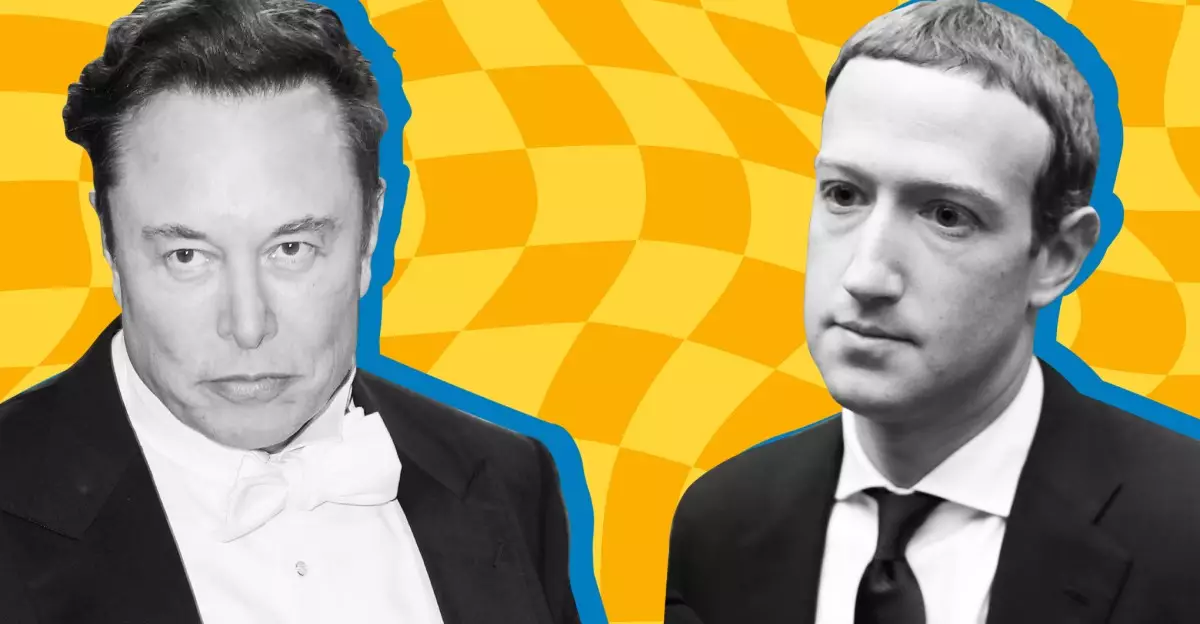In a uniquely surreal twist, the intersection of technology and humor has materialized in the streets of California. The crosswalk buttons in cities such as Palo Alto, Redwood City, and Menlo Park have, quite unexpectedly, been overtaken by apparently AI-generated voices mimicking two of the world’s most famous tech magnates: Elon Musk and Mark Zuckerberg. While these auditory anomalies may cause confusion for some, they also serve as a humorous critique of the very figures living at the forefront of technological advancement. Onlookers have recorded a range of hilarious and ironic messages, from Musk’s desperate plea for friendship to Zuckerberg’s chilling acknowledgment of his company’s role in societal manipulation.
This bizarre phenomenon, which reportedly transpired over a weekend, illustrates the vulnerabilities inherent in our increasingly interconnected world. City officials have responded swiftly to address the situation, disabling the voice features of affected crosswalks while investigations are underway. Despite the concern over functionality and public safety, the incident raises a significant question: Is this a harmless prank, or a serious commentary on the pervasive influence of technology and its purveyors?
Voices of Satire: Musk and Zuckerberg’s Digital Doppelgängers
The prank’s allure lies in its satirical format, which brings a whimsical yet pointed critique of Musk and Zuckerberg to life through audio. The simulated voices portray these billionaires as both comical and self-deprecating, revealing aspects of their personalities that are rarely highlighted in traditional media outlets. For instance, Musk’s supposed voice implores listeners, “Will you be my friend? I’ll give you a Cybertruck, I promise.” Such lines mock the persona of the tech CEO known for his brash confidence and social media antics while revealing a more vulnerable side— a facet that humans often overlook in their fascination with his entrepreneurial feats.
Zuckerberg’s impersonated voice, on the other hand, takes a sharper jab at the ethical dilemmas posed by his company, Meta. When the simulated Zuckerberg brags about “undermining democracy” and “cooking our grandparents’ brains with AI slop,” it cleverly distills public skepticism about the corporate strategies and ramifications of social media in modern society. The significance of these ludicrous messages is underscored by their juxtaposition with necessary civic functions; street crossing signals are designed to protect pedestrians, yet they have been commandeered to poke fun at leaders responsible for shaping our digital landscape.
Technological Vulnerabilities: The Crosswalk Crisis
What’s not to be taken lightly in this episode is the underlying issue of technological vulnerabilities. While the intention of this hack may have been to incite laughter, it highlights the potential risks that come with integrating artificial intelligence into essential public services. The voice features were crafted to assist visually impaired individuals, and the apparent takeover serves as a reminder that even systems designed for good can be manipulated.
City spokespersons have confirmed that 12 intersections were impacted, with voice features suspended until repairs can be finalized, emphasizing that city operations maintain their integrity. Yet, it’s essential to reflect on how reliant society has become on technology and how easily that reliance can be compromised. The incident exemplifies a major concern around technological overreach—how much innovation is too much when it invites disruptions that can masquerade as harmless pranks yet bear serious consequences?
The Blurring Lines Between Reality and AI
This entire escapade raises another crucial point: the blurring of lines between reality and artificial intelligence. Each simulation of Musk and Zuckerberg proffers playful commentary, but they also present a sobering truth about how easily AI can manipulate our perceptions of reality. These impressions—whether comedic or chilling—afford us a lens through which to see the ethical responsibilities tied to tech innovation, urging both creators and consumers to reflect on the consequences emotions and narratives generated by advanced technologies can have on society.
With advancements in AI making it increasingly simple to duplicate any voice or persona, the boundary between parody, satire, and misinformation is rapidly disappearing. While this narrative paradoxically invites delight and dread, it compels us to question: How can we navigate a world in which even our trusted figures can be impersonated at the push of a button? It’s essential for society to engage in discourse surrounding the ethical implications of AI, lest we find ourselves standing impotently before an ever-expansive horizon of digital deception.

